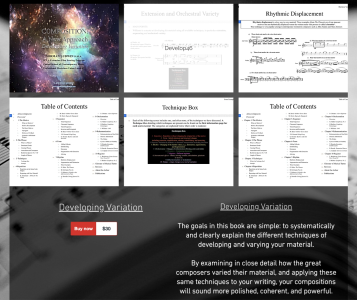That's certainly true, Jim, but it wasn't solely because of some naked innocence of imagination. Each of those composers knew what had come before in specific, musical-language detail.
I don't hear the OP asking "where can I get the formula for shackling myself to what others have done before" He/she is just looking to extend what he/she's already written, a very specific task that is susceptible to useful, practical approaches. One doesn't have to apply rigidly those approaches, but knowing a few things can shine a light on what might be next, based on what one has already invented.
Bag o' Tricks
In the end, we're composers -- we decide what to do. But if one has generated something pretty cool, it doesn't hurt to have someone (even a book) ask a few questions about rhythm, repetition (or lack thereof), tessitura -- a lot of musical aspects that seem to be effective artistically over a long period of time.
Shelf Life
I am prejudiced by having written nearly everything to some infernal deadline, so speed to me is an everyday reality of writing. I can't spend 40 days on a melody. Nevertheless, even if one enjoys a blissful life with no financial or time pressure, there's still something to be said for being able, quickly, to generate several / a dozen alternatives of 'where to go next.'
Sometimes I feel a musical idea has a sort of shelf life that, if not developed with some speed, will wilt / wither / decay to 'blah, I don't care about that anymore.' Even some pretty good ideas, too. Accordingly, having a checklist to speed the composing along, whether that list is from a book or Beethoven's letters, or otherwise, doesn't hurt for idea generation.








